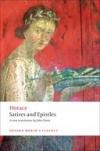Könyv jellemzők | |
|---|---|
| Kiadó | Oxford University Press |
| Kötés | Fűzött |
| ISBN | 9780199563289 |
| Nyelv | Angol |
| Nyelvi szint | C2-anyanyelvi |
| Sorozat | Oxford World\'s Classics |
A new translation of Horace's satires and epistles that does full justice to the caustic, ribald style of the satires, together with an up-to-date critical introduction and notes.
John Davie's prose translation perfectly captures the lively, scurrilous, and frequently hilarious style of the satires, and the warm and engaging persona of the more meditative epistles.
Includes the important Ars poetica, the 'art of poetry', Horace's treatise on poetics in the form of advice to an aspiring writer, particularly of epic and drama.
Robert Cowan's introduction and notes take account of the latest scholarship, and contextualize Horace's poems within the development of Roman satire and the themes of philosophy, morality, sex and gender, literary criticism, politics and patronage.
Horace's works were hugely influential from the Renaissance to the present, on writers from Ben Jonson and Alexander Pope to W.H. Auden and Robert Frost.
Gluttony, lust, and hypocrisy are just a few of the targets of Horace's Satires. Writing in the 30s BC, Horace exposes the vices and follies of his Roman contemporaries, while still finding time to reflect on how to write good satire and along the way
revealing his own persona to be as flawed and bigoted as the people he attacks. Alongside famous episodes such as the fable of the town mouse and the country mouse, the explosive fart of Priapus, and the grotesque dinner party given by the nouveau-riche
Nasidienus, these poems are stuffed full of comic vignettes, moral insights, and Horace's pervasive humanity. They influenced not only Persius and Juvenal but the long tradition of English satire, from Ben Jonson to W. H. Auden. These new prose
translations by John Davie perfectly capture the ribald style of the original.
In the Epistles, Horace uses the form of letters to his friends, acquaintances, foremen, and even the emperor to explore questions of philosophy and how to live a good life

